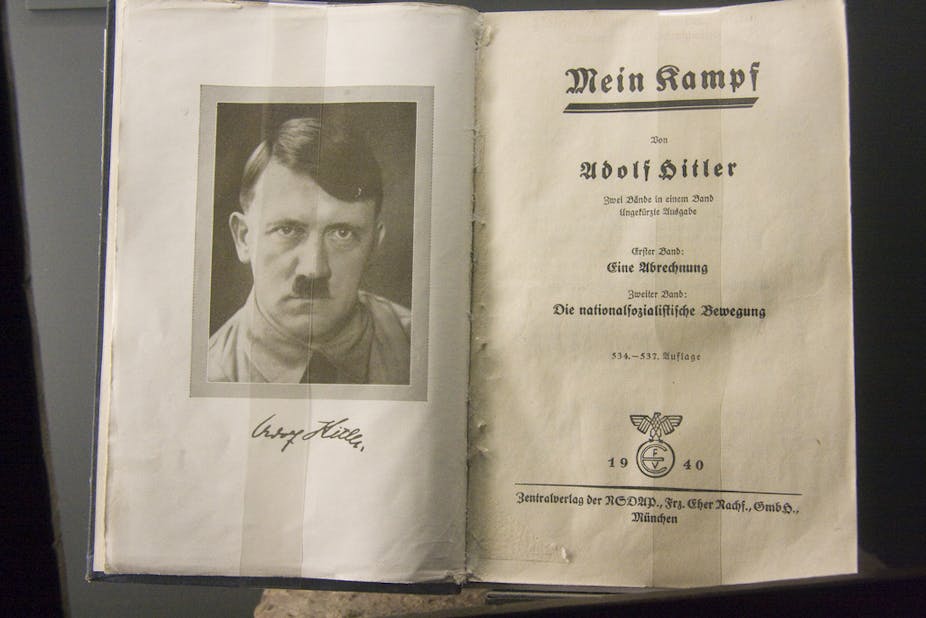Almost 70 years ago, Adolf Hitler committed suicide in the bunker of the Reich Chancellery, marking the downfall of one of the most murderous regimes the world has ever seen.
Decades later, there is still a fierce debate over whether Hitler’s Mein Kampf, the autobiography he dictated to his secretary during his spell in Landsberg prison in 1924, should be re-released in Germany.
Since Hitler was officially domiciled in Munich, his estate, including the copyright to Mein Kampf, fell to the German federal state of Bavaria. Until now, the Bavarian state has claimed the text is dangerous, and any attempt to republish this inflammatory book - a detailed, if tortuous, account of Hitler’s anti-Semitic ideology and his plans for world domination - has been blocked.
This decision is absurd. The text is freely available on the internet in many languages, including English (the first English editions appeared in the 1930s). And several million (mostly unread) copies of Mein Kampf sold in Nazi Germany were often handed down to family members after the war, and are still around.
New edition
In 2015, the Bavarian state’s control over the copyright will expire, and everyone will be allowed to reprint and publish Mein Kampf. In anticipation, the Bavarian authorities have commissioned an academic edition of the text, annotated by leading historians to put Hitler’s inflammatory statements into their proper context. This edition has been widely welcomed.
The Bavarian state’s suppression of Mein Kampf has always been contentious among historians, who have pointed to the inconsistency of this decision, as Hitler’s other writings have been available in Germany since the 1950s. These include Zweites Buch (Second Book), the sequel to Mein Kampf published posthumously in 1961, and a multi-volume edition of Hitler’s pre-1933 speeches and writing.
Behind the official suppression of German editions of Mein Kampf lies the unfounded suspicion that the text would reinforce neo-Nazism and remains too dangerous for public consumption. The Bavarian state’s attitude is based on the very simplistic assumption that Mein Kampf served as the blueprint for what Hitler and the Nazis did during the Third Reich.
This view fundamentally exaggerates the significance of the book and has been dismissed over decades of historical research that highlight the extremely complex decision-making processes of the Nazi regime.
Still, Mein Kampf is important as it shows that Hitler had a more or less coherent world view, the essentials of which were a vicious anti-Semitism and the plan for conquering “living space” (Lebensraum) for the Germans in Eastern Europe.
Too dangerous?
English-speaking newspapers and journals, always keen for sensationalist Nazi-related headlines, have recently reinforced the claim that Mein Kampf is too dangerous for Germans who are still susceptible to Nazi ideology. Nothing could be further from the mark.
For many decades now, an extremely critical view of the Nazi past has emerged as a firm part of German national identity, illustrated most clearly perhaps by the Berlin memorial for the millions of European Jews murdered during the Holocaust.

Still, there is a dangerous potential for anti-Semitism, neo-Nazism and far-right extremism in Germany, as the recently uncovered series of murders perpetrated by a neo-Nazi terror cell reveals.
But neo-Nazism and far-right extremism are probably not more widespread in Germany than in other European countries. Because of Germany’s Nazi past, though, the world media are quite understandably more likely to diagnose such alarming phenomena in Germany than elsewhere.
The recent electoral gains of the far right in the French presidential elections and the 2011 mass murder committed by the Norwegian right-wing extremist, Anders Breivik, suggest a very dangerous rise of far-right extremism throughout Europe in the context of the worst economic crisis since the Great Depression.
Demystifying the text
The long overdue publication of a scholarly, annotated edition of Mein Kampf in Germany will allow Germans to access this controversial, but historically important text that gives an insight into the worldview of one of the 20th century’s most brutal characters.
Whether or not people will read a new edition of Mein Kampf is another question. If more people had read Mein Kampf in the 1930s, perhaps they would have taken Hitler’s ideology more seriously.

